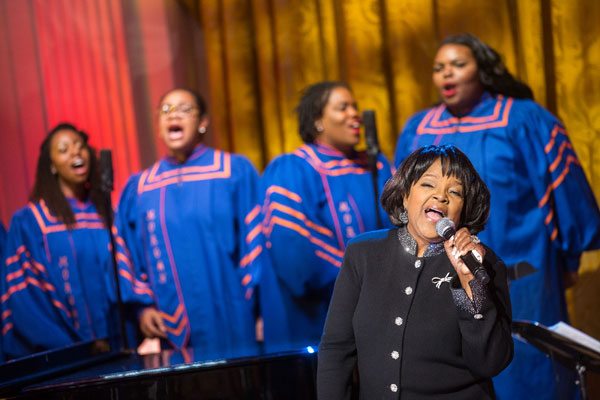
December 8, 2017: Chicago Sun-Times
More than a decade after a fire destroyed the historic Pilgrim Baptist Church in Chicago, the community is finally seeing progress on a redevelopment plan for the site. Recognized as the birthplace of gospel music, what remains of the building will now be renovated into a National Museum of Gospel Music. While plans for other high-profile projects such as the George Lucas museum and the Barack Obama presidential library have come under heavy criticism from community leaders, the vision for a new museum in the Bronzeville community is mainly welcomed in a neighborhood that has struggled to receive the city’s support to revive economically.
Bronzeville is an iconic Chicago neighborhood with a rich history of Black cultural production, politics, and community building. Woven into the history of Bronzeville is the story of gospel music and the legendary singers and musicians that performed at Pilgrim Baptist Church. At a public event to celebrate the announcement of the project, one report noted:
Gospel greats like Marvin Sapp, Smokie Norful, Donald Lawrence, and Charles Jenkins will be in attendance to celebrate a project culminating the decade-long effort to pay tribute to Pilgrim’s long-time music director, the “Father of Gospel Music,” Thomas A. Dorsey. Pilgrim’s music director from 1932 until the late ’70s, the former blues pianist created the music genre by blending Christian praise with the rhythms of jazz and blues, and drew top singers who would become gospel greats to perform at the church, e.g. Mahalia Jackson, Albertina Walker, Aretha Franklin, Sallie Martin, James Cleveland, and the Staples Singers.
In contrast to other high-profile museum projects that recently received powerful criticism from community leaders, the National Museum of Gospel Music honors and builds upon the cultural history of the community while also contributing to economic revitalization.
Led by Mayor Rahm Emanuel, Chicago’s bid to site the George Lucas Museum on public lakefront property was thwarted in 2016 due to community resistance and a lawsuit by Friends of the Park, a nonprofit committed to preserving parks and open space in Chicago. Similarly, many community leaders have voiced their opposition to plans to site the Obama presidential library in Jackson Park. In addition to citing the annexation of public park space and the potential for gentrification, community leaders are displeased with the Obama Foundation’s unwillingness to commit to a community benefits agreement. Drawing upon the experience of gentrification in Bronzeville, one respected community leader has written,
Sign up for our free newsletters
Subscribe to NPQ's newsletters to have our top stories delivered directly to your inbox.
By signing up, you agree to our privacy policy and terms of use, and to receive messages from NPQ and our partners.
While Obama urged residents to “trust” him, we have good reason to want his assurances in writing. Our betrayed trust in Mayor Rahm Emanuel, who was so highly endorsed by Obama, has left us disappointed and distrustful of the former president. City policies started by former Mayor Richard M. Daley and accelerated under Emanuel have demolished public housing, transformed affordable housing into market-rate condominiums and jump-started investment in infrastructure and amenities to attract affluent newcomers.
[…]
Residents of Bronzeville, South Shore, Woodlawn, Washington Park, and other neighborhoods formed the Obama Center Community Benefits Coalition and have heard overwhelming support for the idea among thousands of people. The Obama Foundation, however, has done everything it could to avoid respectful engagement with the coalition.
While the Lucas and Obama projects have felt like fast-paced, top-down plans imposed upon the community with little input, plans for the new National Museum of Gospel Music have developed after many years of community-led fundraising and failed revitalization efforts.
Supported by the church congregation and with support from Don Jackson, the founder of the Stellar Gospel Music Awards, the National Museum of Gospel will open in 2019 at a cost of $32 million. According to reports, the museum will provide community members with access to “a research and listening library; cafe and retail store; a 350-seat auditorium designed for TV production; multi-generational programming and educational exhibits; event rental and community use facilities; and of course, the Stellar Awards’ exclusive video archives, photo and document collections.”
After enduring a devastating fire that caused great pain in the community, the National Museum of Gospel has the potential to contribute to the healing of Bronzeville, and also serve as a model for community led and culturally relevant revitalization in Chicago that politicians have often failed to support in the past.—Antonio Lopez













